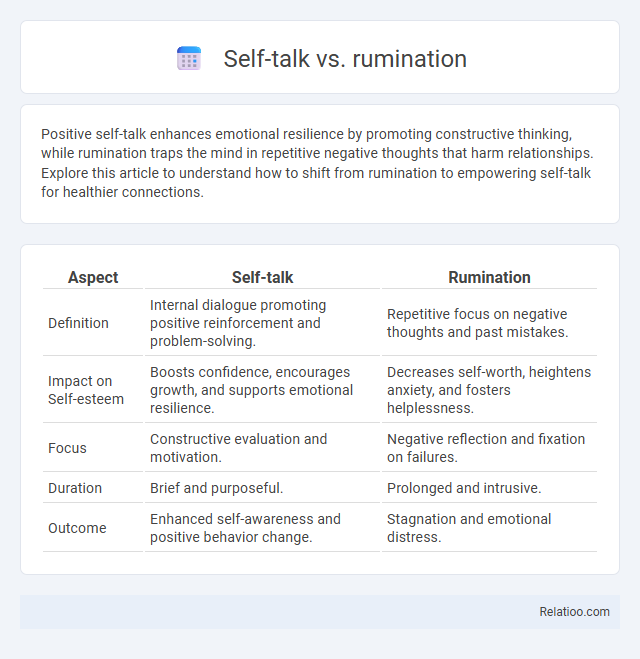Positive self-talk enhances emotional resilience by promoting constructive thinking, while rumination traps the mind in repetitive negative thoughts that harm relationships. Explore this article to understand how to shift from rumination to empowering self-talk for healthier connections.
Table of Comparison
| Aspect | Self-talk | Rumination |
|---|---|---|
| Definition | Internal dialogue promoting positive reinforcement and problem-solving. | Repetitive focus on negative thoughts and past mistakes. |
| Impact on Self-esteem | Boosts confidence, encourages growth, and supports emotional resilience. | Decreases self-worth, heightens anxiety, and fosters helplessness. |
| Focus | Constructive evaluation and motivation. | Negative reflection and fixation on failures. |
| Duration | Brief and purposeful. | Prolonged and intrusive. |
| Outcome | Enhanced self-awareness and positive behavior change. | Stagnation and emotional distress. |
Understanding Self-Talk: Definition and Purpose
Self-talk refers to the internal dialogue individuals engage in to interpret experiences, regulate emotions, and guide behavior, serving as a cognitive tool for self-reflection and problem-solving. Unlike rumination, which involves repetitive and passive focus on distress or negative feelings, self-talk is purposeful and constructive, aiming to enhance motivation, confidence, and mental clarity. Understanding self-talk enables individuals to harness positive internal conversations to improve emotional resilience and decision-making processes.
What Is Rumination? Core Characteristics
Rumination involves repetitive and passive focus on negative thoughts and feelings, often related to past mistakes or problems, distinguishing it from constructive self-talk that aims to solve issues or improve mindset. Core characteristics of rumination include persistent dwelling on distress, difficulty shifting attention away from negative content, and exacerbation of emotional distress, which can contribute to anxiety and depression. Unlike adaptive self-talk, rumination lacks goal-directedness and often leads to cognitive overload and impaired problem-solving abilities.
Self-Talk vs Rumination: Key Differences
Self-talk involves deliberate, constructive inner dialogue that promotes problem-solving and positive mindset, while rumination is characterized by repetitive, negative thinking that intensifies stress and emotional distress. Key differences include purpose and outcome: self-talk aims to motivate and regulate emotions, whereas rumination traps individuals in cycles of negativity and inhibits effective coping. Understanding these distinctions is critical for psychological resilience and mental health improvement.
Psychological Impact of Positive Self-Talk
Positive self-talk promotes mental resilience by reinforcing adaptive thinking patterns and reducing stress levels. Unlike rumination, which amplifies negative emotions and cognitive distortions, positive self-talk enhances emotional regulation and fosters a growth mindset. Studies indicate that consistent positive self-talk improves motivation, self-esteem, and overall psychological well-being, distinguishing it as a crucial intervention in cognitive-behavioral therapy.
The Downside of Chronic Rumination
Chronic rumination traps your mind in repeated negative thoughts, intensifying stress and increasing the risk of depression and anxiety disorders. Unlike constructive self-talk, which promotes problem-solving and emotional regulation, rumination fosters feelings of helplessness and impedes mental clarity. Understanding the harmful effects of persistent rumination is crucial for developing healthier cognitive habits that improve your overall well-being.
Self-Talk and Emotional Regulation
Self-talk, distinguished from rumination, serves as a purposeful inner dialogue that promotes emotional regulation by enabling individuals to reframe negative thoughts and manage stress effectively. Whereas rumination involves repetitive, passive focus on distress, adaptive self-talk fosters cognitive flexibility and resilience through positive affirmations and goal-directed reflection. Optimizing self-talk techniques enhances emotional regulation capacities, reducing anxiety and improving overall mental well-being.
How Rumination Fuels Anxiety and Depression
Rumination involves repetitive, negative self-talk that intensifies anxiety and depression by trapping Your mind in a cycle of distressing thoughts. Unlike constructive self-talk, which promotes problem-solving and emotional regulation, rumination fixates on perceived failures and fears, worsening mental health symptoms. Breaking this pattern requires shifting Your focus toward positive, solution-oriented self-dialogue to reduce the mental strain caused by incessant rumination.
Transforming Rumination Into Constructive Self-Talk
Transforming rumination into constructive self-talk involves shifting repetitive, negative thought patterns into positive, solution-oriented dialogue that promotes mental clarity and emotional resilience. Rumination often traps individuals in cycles of worry and self-criticism, whereas constructive self-talk encourages problem-solving and self-compassion, facilitating healthier cognitive processing. Techniques such as mindfulness, cognitive restructuring, and reframing can effectively redirect rumination towards empowering self-talk, improving overall psychological well-being.
Practical Strategies for Healthy Self-Talk
Healthy self-talk involves positive, constructive inner dialogue that boosts confidence and problem-solving, while rumination traps you in repetitive, negative thoughts that hinder emotional well-being. Practical strategies for fostering healthy self-talk include journaling thoughts to identify patterns, using affirmations to counter negative beliefs, and practicing mindfulness to stay present and reduce overthinking. These techniques empower your mind to shift from destructive rumination to supportive self-communication, improving mental resilience and emotional health.
Breaking the Cycle: Tools to Reduce Rumination
Breaking the cycle between self-talk and rumination requires targeted tools such as mindfulness meditation, cognitive restructuring, and journaling to shift negative thought patterns. Your ability to recognize when self-talk transitions into rumination can empower you to interrupt repetitive, harmful thoughts and foster a more balanced mental state. Consistent practice of these techniques enhances emotional regulation and reduces the intensity and frequency of rumination episodes.

Infographic: Self-talk vs Rumination
 relatioo.com
relatioo.com